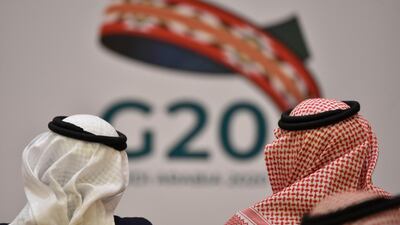The International Monetary Fund and the World Bank called on the Group of 20 leading economies to extend its debt suspension initiative to help poorer countries cope with the economic fallout of the coronavirus pandemic.
World Bank president David Malpass said on Saturday that the situation in developing countries “is increasingly desperate” due to the current situation.
“Time is short," Mr Malpass said. "We need to take action quickly on debt suspension, debt reduction, debt resolution mechanisms and debt transparency.”
The International Monetary Fund also called on the G20 to extend the initiative, named as the Debt Service Suspension Initiative.
“We need to unite to help the poorest and most vulnerable economies, especially those struggling with high debt or dependent on hard-hit sectors,” Kristalina Georgieva, managing director of the IMF said.
“The G20’s Debt Service Suspension Initiative has been commendable and I hope that consideration will be given to extending it. In addition, to make it even more effective, greater private sector participation, and greater debt transparency, should be strongly promoted."
The comments came after finance ministers and central bank governors from the world's 20 leading economies met virtually on Saturday to discuss the global economic outlook and co-ordinate collective action for a robust and sustained global economic recovery.
The meeting was held under the presidency of Saudi Arabia and was chaired by the country’s finance minister Mohammed Aljadaan and Dr Ahmed Alkholifey, governor of the Saudi Arabian Monetary Authority.
“The G20 finance ministers and central bank governors committed to a globally co-ordinated response encompassing all necessary measures to combat the Covid-19 pandemic and lay the foundations for a swift recovery while enhancing resilience against future shocks,” a statement from G20 secretariat said ahead of the meeting.
In April, G20 agreed on an action plan to strengthen international financial assistance for countries in need, especially for the poorest countries. This included the debt suspension initiative to provide over $14 billion (Dh51.41bn) in relief to the poorest nations, enabling them to redirect resources to fight the pandemic.
The latest G20 meeting came as the global economy struggles with the effects of Covid-19, which has claimed the lives of almost 600,000 people globally and infected 14 million, according to Johns Hopkins University, which tracks the outbreak.
The IMF estimates the global economy will shrink 4.9 per cent this year, pushing it into the deepest recession since the Great Depression before a sluggish recovery in 2021. The fund projects a cumulative loss to the global economy of more than $12 trillion in 2020 and 2021 as a fallout from the pandemic.
Globally, two thirds of governments have pumped about $11tn into their economies to stabilise financial markets, support smaller businesses and protect jobs.
Economic activity is slowly picking up as most economies around the world open up, however, the rate of infection is still on the rise in parts of North America, Africa and Asia.
Meanwhile, a top official from the UAE's Ministry of Finance stressed the need to provide an integrated programme to monitor infrastructure financing and bring effective solutions to address the emergency financing needs, particularly for developing countries.
“The world is facing unparalleled fiscal and monetary policy issues, so it is important at this unprecedented time of crisis for the UAE to participate and contribute to the global response,” Younis Haji Al Khoori, undersecretary of the Ministry of Finance said.
Mr Al Khoori made the comments after participating in the fourth meeting of the G20 finance and central bank deputies which was held remotely on July 16 and 17.
Last month, the G20’s International Financial Architecture working group said 41 countries, including 26 African nations, had applied for relief under the initiative. The IMF said poor nations may need additional assistance, including through the G20 programme.


